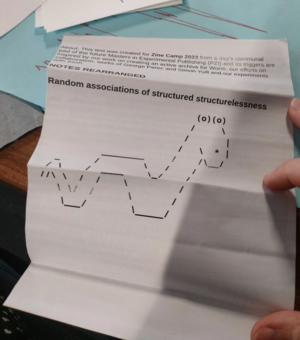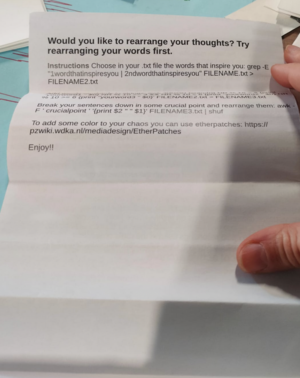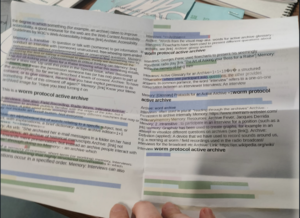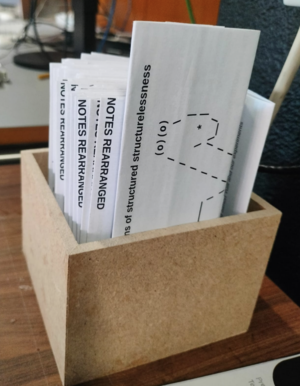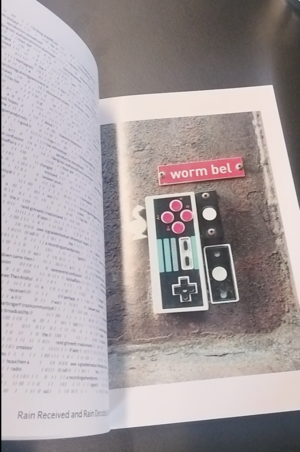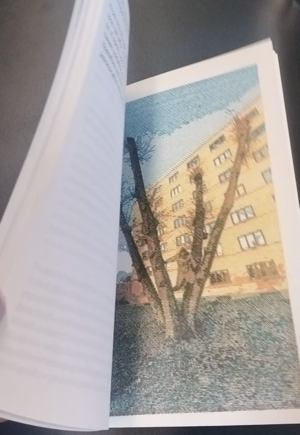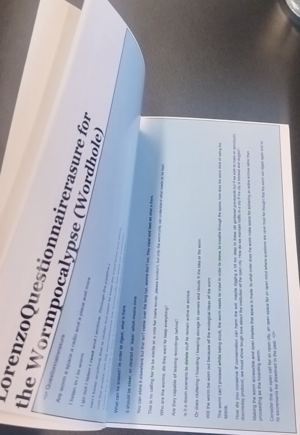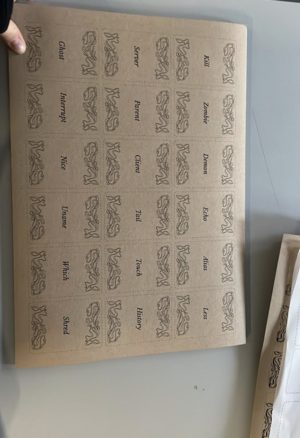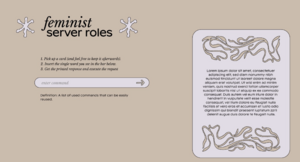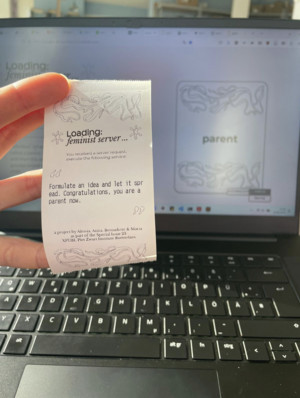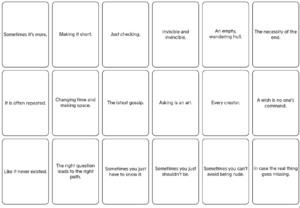User:Mxrwho/Assessssssment
A non-linear presentation
General direction and starting point
Main interests: Language as a collection of segments but also as the non-static, ever changing space of making meaning; the (futile) effort to make language static, to give meaning a permanence that is unnatural, to colonize and monopolize it; the dynamics and importance of language in relation to a person's connection to society and the self.
Influence of the course
I found bash and text manipulating capabilities (commands such as grep, awk, shuf, but also fortunes and aliases) very inspirational, as well as texts and talks connected to the politics of computational language (eg. choices regarding the interpretation of data, or the forming of commands and concepts).
I enjoy comparing how different fields approach language and meaning, and exploring boundaries: Eg. How does computer science perceive language in comparison to semantics, pragmatics, sociolinguistics? What biases affect language aesthetics? To what extend can we use concepts such as intentionality (both in its phenomenological and literary-theory sense) and reader-response, interactionism (in its micro-sociological sense) and psychoanalytic symbolism to analyze and manipulate meaning? What is the role of error in making meaning?
These interests and my direction are evident in the way I explore the above themes in my work:
____________________________________
Random Associations of Structured Structurelessness
I worked on the text from Wednesday's 11/10 pad and used the commands grep
( grep -E "==Archive==|==Interviews==|Memory" 1.txt > 1a.txt )
and awk
( awk 'BEGIN {srand()} NR % 10 < 3 {print "Archive: " $0} NR % 10 >= 3 && NR % 10 < 6 {print "Interviews: " $0} NR % 10 >= 6 {print "Memory: " $0}' 1a.txt > 1b.txt )
to cut and rearrange the text and add the words "archive", "memory" and "interviews".
I used the awk and shuf command further to break and rearrange the sentences
( awk -F ' is ' '{print $2 " " $1}' 1.txt | shuf),
turned the text into html and edited it in sublime to give it a form and add some bold lettering ("the worm protocol active archive" was an accident in a way [my intention was to have these words in bold inside the text, but I apparently didn't code it as I should] but I like accidents too) and did some manual editing (replaced most links with [link] to keep the online feel but also create a sense of absence. Overall I like the associations created within the text that run a bit freely.
A visual element was added by Thijs, the file was converted to .pdf with weasyprint, I asked Senka and Alessia about their opinion regarding ways to fold, and adopted Senka's idea. I also decided to use the box I made in the wood workshop as a container for the folded 'recipes'.
____________________________________
Manual for Post-apocalyptic Radio Making
The apocalypse is an editorial space. On the basis of a pending catastrophe we are called to decide upon the relevance of archives in the future and make choices based on our informed judgement and the needs that we imagine a future society will have in order to (re)build itself and in connection to radio making.
To connect SI22 to the apocalypse narrative I used the transcripts of the interviews we had on 7/11 (rendered by Riviera and Rosa) with prominent Radio WORM radio makers (Lucas, Lieuwe, Ash and Florian) as a radio activation manual and radio community survival guide. Riviera typeset it with ConTeXt and Alessia helped in the printing and binding process. The publication includes photos of WORM as well as an appendix with relevant works of other XPUB1 2023-25 students, a preface, epilogue and introductory texts to its parts. It serves as a manifestation of the post-apocalyptic narrative, as a tribute to Worm RADIO, and as a thank you gift to the makers who opened their arms and studio for us.
In this post-apocalyptic narrative the sense of community is central as well as the desire to establish practices that can be followed and sustained with the minimum possible resources. The archival elements should be economical but also supporting a positive climate of collaboration between the members of an emerging community. The apocalypse is not seen as a frustrating end of things but as an opportunity for a clean start upon the ruins of what might have been good at parts but was also essentially burdening us with its insufferable weight.
You can read the book here: https://hub.xpub.nl/bootleglibrary/book/866
____________________________________
Loading:Feminist Server...
A card-browser game: get a card, type the command in the browser. Receive an interpretation of its function, a connected feminist concept and instructions to execute. Serve and be served as you turn into a feminist server yourself by playing and interacting with the cards both online or one-on-one in the space.
Central to the project is the analogy between software and the material world. This allows for an exploration of the interaction between online and offline environments, and making conscious how this interaction shapes us.
The performative and educational elements are the means of this exploration, as the game invites actions in the physical space.
Through self-reflective and relational qualities, it calls upon the feminist method and literature. A reconsideration of words with a set meaning will occur while playing.
The player(s) will get acquainted with important computational terms and commands, which enable associations extending beyond the terminal, into the social and eventually the personal spheres.
https://hub.xpub.nl/chopchop/si-23-website-table/
Card fronts (to be used in the browser):
kill, zombie, demon, server, parent, client, ghost, interrupt, nice, echo, alias, less, tail, touch, history, uname, which, shred
Card backs:
The necessity of the end. [kill]
An empty, wandering hull. [zombie]
Invisible and invincible. [demon]
A wish is no one's command. [server]
Every creator. [parent]
Asking is an art. [client]
In case the real thing goes missing. [ghost]
Sometimes you can't avoid being rude. [interrupt]
Sometimes you just shouldn't be. [nice]
Just checking. [echo]
Making it short. [alias]
Sometimes it's more. [less]
The latest gossip. [tail]
Changing time and making space. [touch]
It is often repeated. [history]
Sometimes you just have to know. [uname]
The right question leads to the right path. [which]
Like it never existed. [shred]
Printed output
Define a negative thought and ask it to stop. [kill]
Think of a past event that still takes up space in your mind, consuming resources which you could use elsewhere. [zombie]
Think of all the unconscious processes that run your body. [demon]
Give what someone asks for only when they use the right words. [server]
Give something that represents you to someone you care about. [ghost]
Formulate an idea and let it spread. Congratulations, you are a parent now. [parent]
Distract someone for a second and notice how this affects their actions. [interrupt]
Go to the kitchen and ask for food. [client]
Next time you're asked to do something, first do something that you consider more important. [nice]
Choose a sentence you hear in the room and repeat it. [echo]
Choose one of your complex thoughts and give it a simple name. [alias]
Take a snack, break it in smaller bites and eat it slowly. [less]
Ask a friend what they were doing just a moment ago. [tail]
Go to the shelves. Don't touch anything but mark the time. [touch]
Go to the kitchen and make a (mental) list of the latest clients' requests. [history]
Ask someone to describe themselves in a few words. [uname]
Take a look at the info you received at the entrance and locate the shelves. [which]
Rip this paper until no one can read it. [shred]
____________________________________
Future
An installation that will allow the visitor to experience language units (eg. words, sentences, maybe even phonemes as organic elements) as objects, explore the impact these objects have on them, challenge and change them (so, exposing the importance of the narrative and our power over it, understand that every construct can be deconstructed and rebuilt).
Biggest challenge
Narrowing it down theoretically, i.e. focusing on a specific aspect (eg. the interactivist or the reader-response etc.) and formulating it as a thesis.
Readings
Languages and Automata (Alexandra Silva)
Regular Languages and Finite Automata (Andrew Pitts)
Mainframe Experimentalism (Hannah Higgins)
Computing as Writing (Andrew Pitts)
Phenomenology of Spirit (GWF Hegel)
____________________________________
Other influence, in my personal practice
Sound: Field recording as practice and using sound as a tool, embracing imperfection:
My approach has changed since we worked on loops and field recordings: I started recording my works on the go, and adopted a less curated video recording approach:
https://sans-systeme.com/archive/item/172-poetry-issues-28-part-v
In other pieces, the influence of the course was more closely related to the content
https://sans-systeme.com/archive/item/174-poetry-issues-29-part-i
or to just experimenting more with looping:
https://sans-systeme.com/archive/item/175-poetry-issues-29-part-ii
I was also inspired to further and unapologetically combine new and older technologies, repaired an old mini-cassette recorder with sentimental value and included the recording I found (thus, I activated an archive, and I am exploring ways to keep on doing so with other archival material, such as older texts of mine that could use some upcycling):
https://sans-systeme.com/archive/item/176-poetry-issues-29-part-iii
On a more technical note, I set up my own server at home with the main purpose of running an etherpad [ https://pad.sans-systeme.com/ ] meant to be used as a writing platform. However, I am going to expand it and include a chatting/messaging application, to serve the above platform but also maybe to include it somehow as an element in my future work regarding language and the creation of meaning as space.
__________________________________________
Last but not least
Working with others has been a generally positive challenge. It is a constant exercise in balancing, accepting, letting go, supporting and asking for support. It's interesting to see how different and sometimes very specific visions can be combined and how dynamics are constantly shifting and self-regulating in settings with no direct hierarchies.

